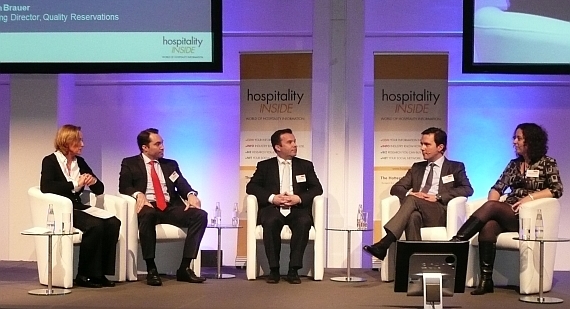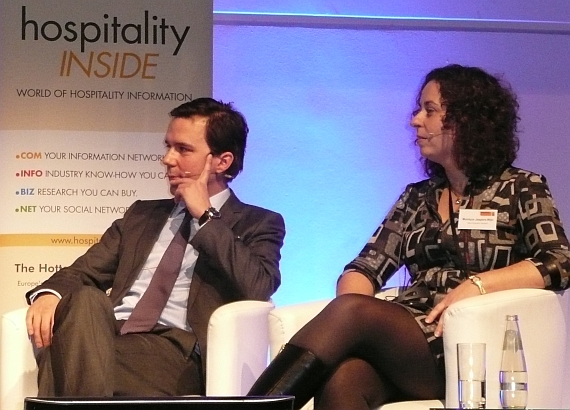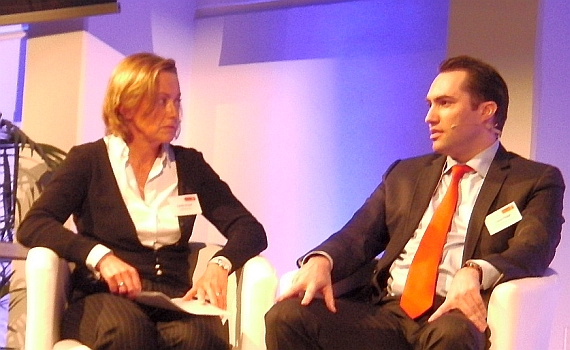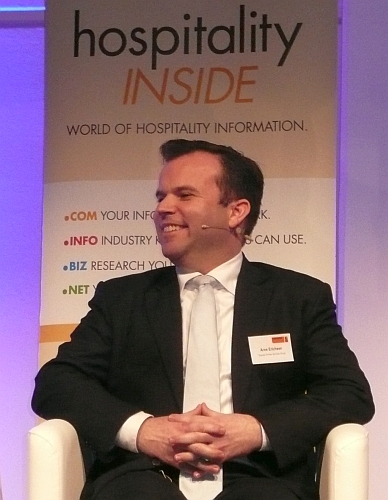ITB distribution panel: Which portals will fall by the wayside?
 |
|
| Distribution touches the current fears of the industry. The panel was one of the best attended during the 7th "ITB Hospitality Day". |
Berlin (March 16, 2012). "Fewer providers with more power?" The slogan of the distribution panel at ITB Berlin's 7th "ITB Hospitality Day" was also the answer: a consolidation process is going on among online travel agents (OTAs) that will leave behind several portals. Online distribution is becoming more and more complex. New portals or niche business models ensure an increasing number of newcomers. At the same time, the giants are preparing a counterstrike.
Whether Google, Sabre or HRS: the big ones are fighting against the small ones to maintain their dominance. And what about hoteliers? "With the right partner, location and rate I can be as effective in terms of sales as the big brands," says Monique Jaspers-Wijn, Head of Europe at Sabre Hospitality Solutions. "Hoteliers are getting smarter; they are closely watching where they can generate business and where they can achieve what rate. If their website is good and simple, there is a big chance that reservations will be placed directly. OTAs provide additional benefits, but collaboration needs to work properly."
 |
|
| Ognjen Zeric of Justbook Mobile and Monique Jaspers-Wijn of Sabre. |
As all distribution channels cost money, hoteliers should also think about spending more on their own appearance instead of falling back on too many different portals. Although this would certainly not guarantee 100 percent occupancy, it would be more satisfying, said Monique Jaspers-Wijn advisingly.
The fact that she argues this way is connected to Sabre's new role. Over the past few years, the former GDS has become a full-service distribution provider that also targets individual hotels. In doing so, Sabre Hospitality Solutions competes with Expedia and HRS, amongst others.
Controversial Room Key portal
Effective self-distribution has become difficult for the major brands as well, and they still fear rising commissions to third parties. A consequence: the development of Room Key. The reservation portal that was founded by six US chains a few months ago continues gathering prominent members. Right after its foundation, Best Western joined spontaneously. Last week, Preferred Hotels followed, and Worldhotels will join in May. "The situation must be desperate if six competitors join together in a single bed," says hosting Carolin Brauer, who leads a reservation platform herself (Quality Reservations).
Concerning Room Key, competitors remain cool. Arne Erichsen from Expedia: "First of all, I'm pretty curious. Up to now, we only have information on the technical background, but there is also the customer side." According to him, the only way Room Key could become a success was to move the chains' entire pool of customers to it.
No fear of Google Hotelfinder
Tobias Ragge of HRS forecasts Room Key will disappear from the market relatively quickly: "The party should be over in one and a half years," he said. The system involved a switch via Pegasus, after all. Therefore, hoteliers would have to pay 25 percent of commission in the end. In order to build up Room Key as a brand, the starting capital of 42 million US dollars was much too low. In addition, the system caused confusion in practice. "Marriott's franchisee expects reservations to be made via Marriott.com, not via Room Key."
 |
|
| Moderator Carolin Brauer and Tobias Ragge of HRS. |
Jaspers-Wijn, however, considers Room Key a major movement. "We don't know whether it will work," she says. "As soon as Room Key opens up for individual hotels, it becomes an OTA."
Tobias Ragge, who has been travelling from one panel to the next since the latest increase in commissions and the related changes in AGB is not afraid of Google's Hotelfinder either. "In our opinion, Google Hotelfinder is and will remain a pure meta search engine. A business model focused on advertising will not find a hotel located in Soest for a Japanese. With an EBIT margin of more than 30 percent, I will start somewhere else and not in the travel industry," he said optimistically.
Fight in the mobile segment
Google did not take any responsibility, said Ragge. After all, for each click the company received money from its customers represented on Google. Those calculating how many expensive clicks turn into a reservation in the end will be surprised. Jaspers-Wijn of Sabre, however, also sees some positive aspects with respect to Hotelfinder. "It is transparent. Those doing the best job at customer satisfaction will get the reservation," she says.
Mobile bookability, which was called MTA (mobile travel agency) during the panel, has recently turned into a new battlefield for online distributors. In this field, the newcomers are Ognjen Zeric, founder and Managing Director of Justbook Mobile. His app for smartphones is oriented towards the "Hotels tonight" US role model offering hotels to sell their rooms at a special rate from noon on the same day.
But as the smartphone market is expected to experience huge growth rates in the future, HRS has been dealing with this for quite a while and recently held the newcomer at bay. But Justbook struck back with a successful preliminary injunction. "We benchmark all competitors, as we cover all channels ourselves," says Ragge. Last minute was a mass market. HRS had long been offering a last minute discount for same day arrivals starting at 12 o'clock, but due to mobile booking, this particular service gained in importance. Ragge: "It is self-evident that we're not an altruistic charity club."
 |
|
| Arne Erichsen of Expedia. |
Fears of dramatic changes
But who or what will be left of OTAs and MTAs five years from now? "In five years, we will have a different market structure," says Zeric convincingly. Every innovation on the market called for new players. As far as distribution was concerned, only few providers could dominate. "It is not only about building up a website. But generating direct reservations on that site is very difficult in itself."
Arne Erichsen of Expedia does not consider the situation as dramatic: "We have totally different possibilities of online presentation compared to former GDSs. There are individual hotels reporting 40 to 42 percent of online sales via their own website. But if I also want foreign customers, airline customers etc., I need to look closely at what I can do myself and what not." Long-term interaction, said Erichsen, took place inside the hotels.
Ragge expects a dramatic change on the market. Channels would become increasingly fragmented and players willing to survive had to cover these channels. "We need to hire more and more experts working on highly specific issues. We are concerned with questions like: How do customers get there and how does an inquiry become a reservation? As regards OTAs, there will be further concentration and consolidation. Major players that remain innovative will generate benefits for themselves." After all, the widely known "The fast eat the slow" slogan is valid here as well, instead of "Big is beautiful". For him, optimizing online handling had top priority.
Quick or die
With increasing globalisation the pace of expansion will play an important role in the battle for survival. According to Erichsen, Expedia had a partnership with Air Asia for many years and was present in Scandinavia and Eastern Europe. However, providing offerings in other languages was definitely challenging. In the medium term, Ragge aims at expanding to Eastern Europe, Asia and South America. Zeric of Justbook
Mobile wants to concentrate on Europe and further developing customized customer approaches.
Monique Jaspers-Wijn summarises what the portal's selective globalization means for hoteliers: "I need to identify the markets that are relevant to my hotel. And the ways they book. Although China offers great potential, it was necessary to invest a lot of money to win over these guests." / Susanne Stauss
Continuative Links:
- March 23, 2012 Summaries and videos of all ITB Hospitality Day panels 2012
- March 16, 2012 Forecasts versus sense: Great mood at ITB and great forecasts – but insecurity remains
To print this article you have to be registered and logged in for newsletter, visitor or subscription.





